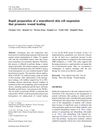 4 citations,
September 2021 in “Biomolecules”
4 citations,
September 2021 in “Biomolecules” Using Platelet-Rich Plasma and Adipose-Derived Mesenchymal Stem Cells together can improve healing, including wound healing, bone regeneration, and hair growth.
2 citations,
January 2024 in “Pharmaceuticals” Deep eutectic solvents are eco-friendly and effective for extracting useful pharmaceutical compounds.
 2 citations,
August 2023 in “Life”
2 citations,
August 2023 in “Life” Bioinspired polymers are promising for advanced medical treatments and tissue repair.
 2 citations,
June 2023 in “Gels”
2 citations,
June 2023 in “Gels” Injectable hydrogels are becoming increasingly useful in medicine for drug delivery and tissue repair.
2 citations,
May 2021 in “International journal of molecular sciences” Stem cells from hair follicles in a special gel show strong potential for bone regeneration.
1 citations,
October 2023 in “Animals” A small dose of Platycladus orientalis leaf extract improves raccoon dogs' growth and health, but higher doses can be harmful.
 April 2023 in “Bulletin of the National Research Centre”
April 2023 in “Bulletin of the National Research Centre” The document concludes that more research is needed to understand how PRP affects the ovaries and to standardize its use in treatment.
 August 2022 in “IntechOpen eBooks”
August 2022 in “IntechOpen eBooks” Congenital Adrenal Hyperplasia is a rare inherited disease causing hormone imbalances, affecting growth, fertility, and heart health, diagnosed through blood tests and treated with medication and lifestyle changes.
The modified stem cells with VEGF165 in a special scaffold improved blood vessel growth and wound healing for skin repair.
3 citations,
November 2021 in “Journal of biomedical materials research. Part B, Applied biomaterials” AMFIBHA scaffold significantly healed large full-thickness burn wounds in rabbits and restored skin's mechanical properties.
 75 citations,
January 2011 in “Plastic and Reconstructive Surgery”
75 citations,
January 2011 in “Plastic and Reconstructive Surgery” The dermal regeneration template is effective in skin regeneration, reducing scarring, and has potential for future improvements.
 84 citations,
January 2018 in “Biomaterials Science”
84 citations,
January 2018 in “Biomaterials Science” Sericin hydrogels heal skin wounds well, regrowing hair and glands with less scarring.
 11 citations,
August 2018 in “Facial Plastic Surgery Clinics of North America”
11 citations,
August 2018 in “Facial Plastic Surgery Clinics of North America” Adipose-derived stem cells show potential for skin rejuvenation and wound healing but require more research to overcome challenges and ensure safety.
 5 citations,
March 2017 in “Cell and Tissue Banking”
5 citations,
March 2017 in “Cell and Tissue Banking” Researchers developed a new method to quickly prepare skin cells that improve wound healing in rats.
 29 citations,
April 2020 in “Journal of Tissue Engineering and Regenerative Medicine”
29 citations,
April 2020 in “Journal of Tissue Engineering and Regenerative Medicine” The experiment showed that human skin grown in the lab started to form early hair structures when special cell clusters were added.
 5 citations,
September 2019 in “ACS Applied Bio Materials”
5 citations,
September 2019 in “ACS Applied Bio Materials” The hydrogel with bioactive factors improves skin healing and regeneration.
 4 citations,
January 2022 in “Journal of clinical and translational research”
4 citations,
January 2022 in “Journal of clinical and translational research” Chitosan-based dressings reduce inflammation and speed up skin wound healing.
39 citations,
May 2015 in “Advanced drug delivery reviews” MicroRNAs could improve skin tissue engineering by regulating cells and changing the skin's bioactive environment.
 16 citations,
September 2018 in “Scientific reports”
16 citations,
September 2018 in “Scientific reports” Scientists created keratinocyte cell lines from human hair that can differentiate similarly to normal skin cells, offering a new way to study skin biology and diseases.
March 2024 in “Biomedicines” Mesenchymal stem cells show promise for effective skin repair and regeneration.
 1 citations,
May 2017 in “Asian journal of medical sciences”
1 citations,
May 2017 in “Asian journal of medical sciences” The dietary supplement significantly improved skin, nails, and hair in older adults.
 43 citations,
July 2014 in “Experimental Dermatology”
43 citations,
July 2014 in “Experimental Dermatology” Hair follicles can help wounds heal faster and this knowledge could be used to treat chronic skin ulcers, with a potential use of a special stem cell hydrogel to enhance healing.
 5 citations,
December 2017 in “Tissue and cell/Tissue & cell”
5 citations,
December 2017 in “Tissue and cell/Tissue & cell” Researchers found stem cells in dog hair follicles using specific markers.
 178 citations,
August 2016 in “Advances in wound care”
178 citations,
August 2016 in “Advances in wound care” New effective scar treatments are urgently needed due to the current options' limited success.
 8 citations,
July 2022 in “International Journal of Molecular Sciences”
8 citations,
July 2022 in “International Journal of Molecular Sciences” Skin cells release substances important for healing and fighting infection, and understanding these could improve skin disorder treatments.
9 citations,
June 2019 in “Cell cycle/Cell cycle (Georgetown, Tex. Online)” A specific RNA increases hair stem cell growth and skin healing by affecting a protein through interaction with a microRNA.
6 citations,
June 2012 in “PloS one” A new mRNA variant of the SCF gene in sheep skin produces a shorter, different protein.
 October 2021 in “Austin journal of biomedical engineering”
October 2021 in “Austin journal of biomedical engineering” The material combining eggshell protein and scaffold helps wounds heal faster and regenerates tissue effectively.
 41 citations,
August 2015 in “The FASEB Journal”
41 citations,
August 2015 in “The FASEB Journal” Blocking the Wnt/β‐catenin pathway can speed up wound healing, reduce scarring, and improve cartilage repair.
21 citations,
August 2017 in “Journal of veterinary internal medicine” Combining amino acid and stem cell therapy may help manage hepatocutaneous syndrome in dogs.



















